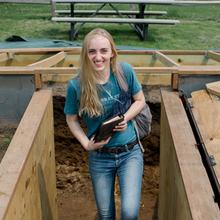Shan Kothari, who spent three summers doing research at U of M’s Cedar Creek Ecosystem Science Reserve, is wrapping up his dissertation in the College of Biological Sciences Cavender-Bares lab with the support of the Doctoral Dissertation Fellowship.
What are you studying?
I study plant communities and the ways they interact with their light environment. What counts as too much or not enough light? And how could excess light be a bad thing? During my fieldwork in a tree diversity experiment at Cedar Creek, I noticed that some species seemed to do better growing in the shade of large neighbors than in monoculture. Those observations helped me realize that photoprotection—protection from excess light—is a core part of plant function.
What’s surprised you during your studies?
When I started graduate school, I really thought I could generate ideas and questions out of thin air by knowing enough ecological theory, but most of my best ideas have come from spending a lot of time in the field throughout the year. My favorite projects started by just noticing the ways plants defy my expectations.
The Department of Plant and Microbial Biology recently stopped requiring GRE scores in the admission process. You helped push for this change. What motivated you?
There’s been a movement across universities and online to remove the GRE from the admissions process. The GRE is expensive, and in many places, testing centers are hard to find. This evident barrier to inclusivity—and a hint of residual resentment at having paid all that money myself—fired me up enough to send an email asking why we couldn’t just drop it. The administration was very open to the idea, and I’m glad they were willing to take up the issue with the faculty.



